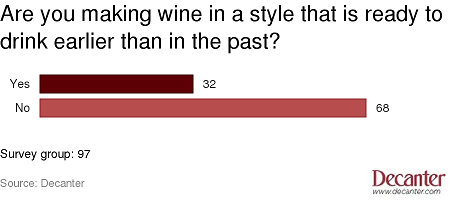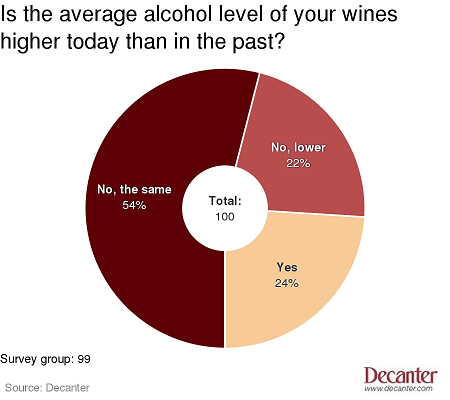See the charts below to discover the views of some of the world's leading winemakers on climate change, their dream regions to make wine (other than their own) and whether they intentionally make wines to drink earlier.
Burgundy is popular with many winemakers
For its July issue, Decanter questioned 133 of the world’s leading winemakers about which of their peers they most admired.
Producers were also asked a list of questions about the effects of climate change on their vineyards, whether they intentially make wine that is ready to drink sooner and where else in the world they would love to make wine. See the responses as charts below.
Do you want to know which winemakers are most respected by their peers? Subscribe to the July issue of Decanter magazine, out now, to see who our survey group voted for.

More than half of the winemakers who responded to this question said that climate challenge has been a challenge for them to manage in recent years, although there is clearly a debate to be had in the sector. Nearly one in five said climate change had proved positive for their wines and around a third said they hadn’t seen any effects.

There is a perception that growing numbers of wine lovers, and especially younger ones, are no longer content to leave bottles gathering dust for several years before popping the corks. A 10-year ageing period used to be the norm for claret, but some winemakers at Decanter’s recent Bordeaux Fine Wine Encounter said they considered earlier drinking windows when making their wines. However, 68% of winemakers worldwide surveyed for these results do not do this.

Burgundy has a place in the heart of many of the winemakers questioned, as shown by the chart above. But, how many could afford to buy there? French government figures out this week show that grand cru vineyards in the Cote d’Or cost an average 4.35m euros per hectare in 2014. Following closely behind Burgundy in this survey is northern Italy, with some producers naming Barolo specifically and others naming Piedmont in general. New Zealand is the New World winner, ahead of Napa Valley and Argentina.

One in four winemakers surveyed said that alcohol levels in their wines have risen in general in recent years, but almost as many producers said that their alcohol levels have gone down – suggesting no easy way to generalise across the wine world. Around half of winemakers said their alcohol levels have remained the same.
The chart below shows the extent to which winemakers keep one eye on the critics while in the cellar. A majority did admit to paying some attention to what critics and awards judges say, although 40% claimed that critics’ opinions were of little concern. Click the segments to see specific percentages.
Written by Chris Mercer







